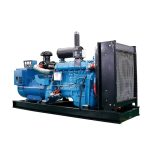Powering Small Businesses with Diesel Generators

Introduction
In the fast-paced world of small businesses, ensuring a reliable source of power is crucial for operations to run smoothly. Power outages can disrupt business activities, leading to loss of productivity, revenue, and customer satisfaction. This is where diesel generators come into play as a reliable and efficient solution to provide backup power for small businesses. In this comprehensive guide, we will explore the benefits, considerations, and applications of diesel generators for small business owners.
Benefits of Diesel Generators for Small Businesses

1. Reliability: One of the key advantages of diesel generators is their reliability. Diesel engines are known for their robust construction and durability, making them ideal for continuous use in demanding environments. Small businesses can rely on diesel generators to provide backup power during outages, ensuring uninterrupted operations.
2. Fuel Efficiency: Diesel generators are more fuel-efficient compared to their gasoline counterparts. This means that small businesses can benefit from lower fuel consumption and reduced operating costs over the long term. Diesel fuel is also less volatile and safer to store, making it a preferred choice for backup power generation.
3. Longevity: Diesel generators are built to last, with many models designed to withstand heavy usage and harsh conditions. With proper maintenance and care, a diesel generator can provide reliable backup power for small businesses for many years, ensuring a good return on investment.
4. Power Output: Diesel generators are capable of producing high power output, making them suitable for running essential business equipment and appliances. Whether it's powering computers, lighting, HVAC systems, or machinery, a diesel generator can meet the electricity demands of small businesses effectively.
5. Quick Start-Up: Diesel generators have a quick start-up time, allowing small businesses to switch to backup power almost instantly when the main power source fails. This rapid response time is critical for maintaining business continuity and preventing any disruptions in operations.
Considerations When Choosing a Diesel Generator for Your Small Business
1. Power Requirements: Before selecting a diesel generator, it's essential to determine the power requirements of your small business. Calculate the total wattage of all the equipment that needs to be powered during an outage to ensure that the generator can meet your electricity needs.
2. Size and Portability: Consider the physical size and portability of the diesel generator, especially if space is limited at your business premises. Choose a generator that can be easily installed and moved if necessary, without compromising its power output and efficiency.
3. Noise Level: Diesel generators can be noisy during operation, so it's important to consider the noise levels produced by the generator. Look for models with soundproofing features or consider positioning the generator in a location that minimizes noise disturbance to employees and neighboring properties.
4. Fuel Storage and Consumption: Evaluate the fuel storage requirements and consumption rate of the diesel generator. Ensure that you have a sufficient supply of diesel fuel on hand to sustain the generator during extended power outages. Factor in fuel costs and availability in your decision-making process.
5. Maintenance and Service: Regular maintenance is essential to keep a diesel generator in optimal condition and ensure its reliability during emergencies. Consider the availability of service providers, spare parts, and technical support when choosing a generator model for your small business.
Applications of Diesel Generators for Small Businesses
1. Retail Stores: Retail businesses rely on electricity to power lighting, cash registers, security systems, and refrigeration units. A diesel generator can provide backup power to keep the store operational during outages and prevent loss of perishable goods.
2. Restaurants and Cafes: Restaurants and cafes depend on electricity to run kitchen equipment, refrigerators, freezers, and lighting. visit our website can ensure that food preparation and service continue uninterrupted, even when the main power supply is down.
3. Offices: Office buildings require electricity to operate computers, servers, printers, and HVAC systems. A diesel generator can maintain essential office functions during power outages, allowing employees to continue working without disruptions.
4. Medical Facilities: Medical clinics, pharmacies, and laboratories need a reliable power source to operate critical equipment, such as diagnostic machines, refrigeration units, and lighting. A diesel generator can provide backup power to ensure that patient care and medical services are not compromised during emergencies.
5. Construction Sites: Construction projects often take place in remote locations or areas with unreliable power supply. Diesel generators are commonly used on construction sites to power tools, machinery, and temporary structures, enabling work to proceed smoothly and on schedule.
Conclusion
In conclusion, diesel generators offer small businesses a reliable and efficient solution for backup power generation. With their durability, fuel efficiency, high power output, and quick start-up time, diesel generators can ensure business continuity during power outages and emergencies. By considering factors such as power requirements, size, noise level, fuel storage, and maintenance, small business owners can choose the right diesel generator to meet their specific needs. Whether it's a retail store, restaurant, office, medical facility, or construction site, diesel generators play a vital role in keeping operations running smoothly and minimizing downtime. Invest in a diesel generator today to safeguard your small business against the uncertainties of power outages.
